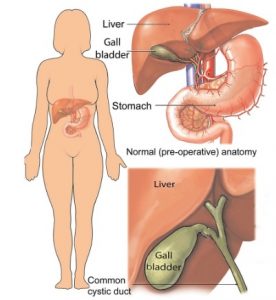Gall bladder problems are very common with over 700,000 being removed annually in the U.S. alone. A cholecystectomy is surgery to remove the gallbladder. In most cases, the pain of a malfunctioning gallbladder becomes so bad, that surgery is the only viable option. Most people are under the impression that once their gallbladder is taken out, the pain and discomfort they’ve been living with will be gone. Sadly that’s often not the case. It is common to have just as much discomfort after the gallbladder is removed.
People without a gallbladder are more prone to digestive problems and liver problems; they can even form stones within the ducts of the liver. The risk of developing a fatty liver is also greater in people without a gallbladder. Some herbs and nutritional supplements are extremely beneficial if you don’t have a gallbladder.
Anatomy of the gall bladder

What does the gall bladder actually do?
Your gallbladder is important. Your liver continually manufactures bile, which travels to your gallbladder, where it is stored and concentrated. Bile helps you to digest fat; therefore your gallbladder secretes a lot of bile into your intestines after you’ve eaten a fatty meal. Bile is also your body’s way of excreting wastes and toxins. Bile contains cholesterol and other fats that your liver has broken down and wants to excrete. A well functioning gallbladder helps your body excrete cholesterol, other fats and fat soluble toxins.
What happens once your gall bladder is removed?
Your liver continues to manufacture bile, but there is no longer a place to store it or concentrate it. Therefore bile continually slowly trickles into intestines. If you eat a fatty meal, you will not be able to secrete a large enough amount of bile into your intestines, therefore the fat will be poorly digested. This means many people experience diarrhea, bloating, nausea or indigestion.
Not digesting fat well means you will not be able to digest essential fatty acids, including omega 3 and omega 6 fats. It also means you’ll have a hard time absorbing fat soluble vitamins such as vitamins D, E, A and K. These nutrients are vital for good health, and you will probably need to take a supplement.
How to have a healthy liver and keep your gall bladder
First of all it’s important to realise that you developed a gallbladder problem in the first place because you had an unhealthy liver. If your liver is not healthy, it will make poor quality bile. The bile will be prone to forming sludge and stones. Just whipping the gallbladder out doesn’t solve that problem, and in fact sludge and stones can form within the liver, compromising its function.
Some general tips that may help:
- Keep your intake of dairy products and processed grains to a minimum or avoid them altogether. Dairy products (milk, cheese, ice-cream, yoghurt) may aggravate gallbladder disease, liver disease as they can be very difficult to digest. Food intolerance is a common cause of gallbladder problems, and there is research that links gluten intolerance with gallstones. A good reason to keep your intake of processed grains low is to reduce the risk of developing a fatty liver.
- Eat some good fats and avoid the bad fats. Your doctor may have recommended you follow a low fat diet after having your gallbladder removed. This is not necessary and in fact it is harmful. Your body desperately needs good fats and it is beneficial to include moderate quantities of extra virgin olive oil, avocados, oily fish (sardines), nuts and seeds in your diet.
- Include some bitter and sour foods in your diet. These help to improve your digestion and make it easier to tolerate good fats in your diet. Suitable bitter and sour foods include lemons, limes, radicchio lettuce, chicory, endive and dandelion leaves. These leaves are fairly easy to grow at home if you are lucky enough to have your own veggie patch.
- Ensure you consume adequate amounts of dietary fibre – predominantly from fresh fruit and vegetables as fibre helps to clear toxins and prevent further burden on the liver.
- If you have already had your gall bladder removed, you may find that taking digestive enzymes may aid digestion. Or your Naturopath may opt for a herbal tonic to support both liver and digestive function.
- Your health professional may monitor your fat soluble vitamin levels – these include Vitamins A, E and D.
The above is generalised information and I highly recommend that, should you have any digestive discomfort, you consult a qualified health professional. As a Naturopath I have supported many people with gall bladder issues who retained this organ for many years and remain well to this day.
Every organ plays a role and removal should be a last resort. Some risks associated with removal include:
A cholecystectomy is a very safe procedure. As with all surgery, however, there is a very small risk of complications, which include:
- leaking bile
- bleeding
- blood clots
- heart problems
- infection
- injury of other organs
- pancreatitis
- pneumonia
